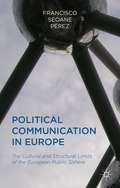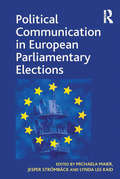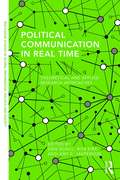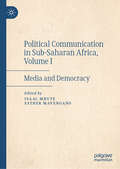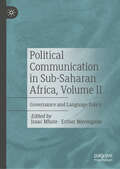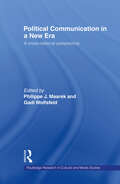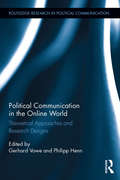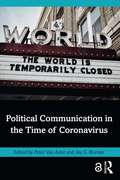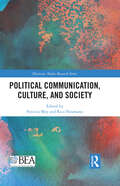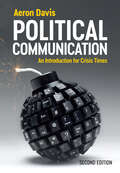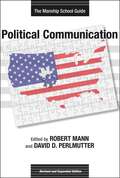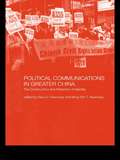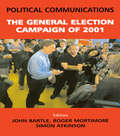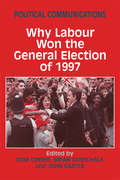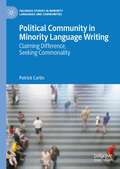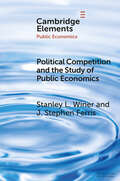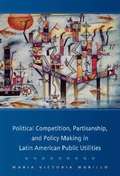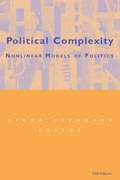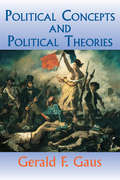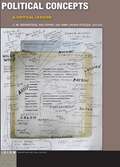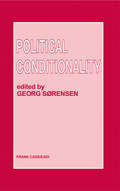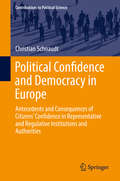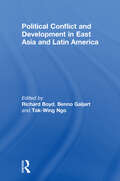- Table View
- List View
Political Communication in Europe: The Cultural and Structural Limits of the European Public Sphere
by Francisco Seoane PérezThe disconnection between the institutions of the EU and the people of Europe has often been attributed to the existence of a communication gap resulting from the failure of national medias and politicians to convey the importance of the EU. This book challenges that idea instead showing that the fault lies with the idea and institutions of the EU.
Political Communication in European Parliamentary Elections
by Michaela Maier Jesper StrömbäckWritten by a leading team of internationally distinguished political communication scholars, this book offers the most comprehensive account on comparative political communication research in the context of European Parliamentary elections to date. Divided into four sections, experts begin by tracing the historical and political background of European Parliamentary elections, paying close attention to trends in turnout and the changing institutional role of the European Parliament (EP). Focusing mainly on the 2009 elections and using original data throughout, the next two sections are devoted to campaign communication strategies and the overall media coverage of EP elections in both established and newly-accessioned members of the European Union. The concluding section focuses on the macro- and micro-level effects of European parliamentary campaigns in a comparative perspective to illustrate how campaign strategies and media coverage were received by voters in EU member states. This insightful account on the interaction between political actors, the media, and voters allows readers to develop a global understanding of political and media system interdependencies and on comparative political communication research more generally. Essential reading to students and scholars in political science, media studies, European politics, and political communication, as well as policy makers within the European Union.
Political Communication in Postmodern Democracy
by Katrin Voltmer Kees BrantsThis book explores the changing relationship between politics, the media and citizens. Based on comparative evidence from the UK and the Netherlands it provides new insights into the dynamics of political communication in post-modern democracy, which is characterized by uncertainty about the location of politics and an erosion of grand narratives and political ideologies. The contributions of this volume aim to understand these changes as a two-dimensional process: the horizontal dimension encompasses the shifting power balance between politicians and the media. The vertical dimension explores how new forms of citizenship and the pervasiveness of popular culture alongside new communication technologies are challenging the authority of both established journalism and institutionalized politics. What emerges is a complex picture of politicization and de-politicization, elite dominance and the power of vox populi, mediatisation and effective control of political elites over the public agenda.
Political Communication in Real Time: Theoretical and Applied Research Approaches (Routledge Studies in Global Information, Politics and Society)
by Amy E. Jasperson Dan Schill Rita KirkMuch has been made of the speed and constancy of modern politics. Whether watching cable news, retweeting political posts, or receiving news alerts on our phones, political communication now happens continuously and in real time. Traditional research methods often do not capture this dynamic environment. Early studies that guided the study of political communication took place at a time when transistors and FM radio, television, and widely distributed films technologically changed the way people gained information and developed knowledge of the world around them. Now, the environment has transformed again through digital innovations. This book provides one of the first systematic assessment of real-time methods used to study the new digital media environment. It features twelve chapters—authored by leading researchers in the field—using continuous or real time response methods to study political communication in various forms. Moreover, the authors explain how viewer attitudes can be measured over time, message effects can be pin-pointed down to the second of impact, behaviors can be tracked and analyzed unobtrusively, and respondents can naturally respond on their smartphone, tablet, or even console gaming system. Leading practitioners in the field working for CNN, Microsoft, and Twitter show how the approach is being innovatively used in the field. Political Communication in Real Time is a welcome addition to the growing field of interest in "big data" and continuous response research. This volume will appeal to scholars and practitioners in political science and communication studies wishing to gain new insights into the strengths and limitations of this approach. Political communication is a continuous process, so theories, applications, and cognitive models of such communication require continuous measures and methods.
Political Communication in Sub-Saharan Africa, Volume I: Media and Democracy
by Isaac Mhute Esther MavenganoThis book is one of two volumes that examines the role of political communication, media and language in transforming politics, governance and democracy in Sub-Saharan Africa. Interdisciplinary in approach, this first volume assesses themes including participatory politics, mass media, digital censorship, and social media and politics in the region. It also considers how politicians utilise language and the media to legitimate their authority, influence citizens’ behaviour, and the ways in which they vote. It will appeal to all those interested in governance, political communication, media studies and African politics.
Political Communication in Sub-Saharan Africa, Volume II: Governance and Language Policy
by Isaac Mhute Esther MavenganoThis book is one of two volumes that examines the role of political communication, media and language in transforming politics, governance and democracy in sub-Saharan Africa. Interdisciplinary in approach, this second volume analyses themes including political advertising and rhetoric, activism, populism, fake news, and political violence. Combining theoretical work with individual case studies on countries including Tanzania, South Africa, Zimbabwe, Nigeria and Ghana, the book highlights the important connection between political communication and governance, and the ways in which language reforms can help to overcome challenges related to public administration. It will appeal to all those interested in public policy, public administration, governance, and political communication, as well as linguistics, media studies and African politics.
Political Communication in a New Era: A Cross-national Perspective (Routledge Research in Cultural and Media Studies #Vol. 10)
by Philippe J. Maarek Gadi WolfsfeldThis book seeks to provide readers with a cross-national perspective concerning the art of political communication in a field increasingly affected by globalization, fragmentation of political audiences, and the rise of professional communications experts - a field concerned not only with how leaders are chosen, but also with how they govern.Structured in two sections, Political Communication in a New Era examines both methods of gathering and disseminating information in a time of technological transformation, and developments in the uses of political communication across the globe. Contributors offer perspectives from Canada, France, Germany, Israel, Italy and the United States.
Political Communication in the Online World: Theoretical Approaches and Research Designs (Routledge Research in Political Communication)
by Gerhard Vowe Philipp HennAs a consequence of the rapid diffusion of online media, the conditions for political communication, and research concerning it have radically changed. Is empirical communication research capable of consistently describing and explaining the changes in political communication in the online world both from a theoretical and methodological perspective? In this book, Gerhard Vowe, Philipp Henn, and a group of leading international experts in the field of communication studies guide the reader through the complexities of political communication, and evaluate whether and to what extent existing theoretical approaches and research designs are relevant to the online world. In the first part of the book, nine chapters offer researchers the opportunity to test the basic assumptions of prominent theories in the field, to specify them in terms of the conditions of political communication in the online world and to modify them in view of the systematically gained experiences. The second methodological section tests the variations of content analysis, surveys, expert interviews and network analyses in an online environment and documents how successful these methods of empirical analysis have proven to be in political communication. Written accessibly and contributing to key debates on political communication, this bookshelf essential presents an indispensable account of the necessary tools needed to allow researchers decide which approach and method is better suited to answer their online problem.
Political Communication in the Time of Coronavirus
by Peter Van AelstThis book examines how the COVID-19 pandemic impacted the flows of communication between politicians, journalists, and citizens. Distinguished contributors grapple with how the pandemic, as a global unexpected event, disrupted the communication process and changed the relationships between politics, media, and publics, the three central players of political communication. Using different methodologies, they scrutinize changes in government communication, (new) media coverage, and public opinion during this crisis. The book moves beyond the USA and Western Europe to include cases from Eastern Europe, Latin America, and Asia, taking into account how variations in the political context, the media system and personal leadership can influence how the COVID-19 pandemic challenged the political communication process. It is an ideal text for advanced students and scholars of political communication, political science, and media studies.
Political Communication, Culture, and Society (Electronic Media Research Series)
by Patricia Moy Rico NeumannAs an installment of Routledge’s Broadcast Education Association (BEA) Electronic Media Research Series, Political Communication, Culture, and Society focuses on the expansive concept of political communication and illuminates the processes, contents, and effects related to myriad forms and vehicles of political communication. Whether involving traditional print or broadcast media, social media platforms, or face-to-face discussions, political communication today has shaped how we perceive others and understand the world around us, including our place in it, and ultimately, how we engage with others as social, cultural, and political beings. Hailing from multiple locations and drawing on a multitude of theories as well as quantitative and qualitative methodologies, the volume’s contributors examine how communication intersects with politics in a broad swath of contexts, ranging from climate change to migration to the notion of political correctness. Collectively they ask and answer questions about how today’s richly textured media ecology shapes our political world and how political messages can fuel – and ameliorate – the issues that deeply cleave societies around the globe. Relevant to scholars and students of journalism, media studies, and communication sciences, this volume will help interested readers better understand today’s increasingly complex sociocultural world through the lens of political communication
Political Communication, Culture, and Society (Electronic Media Research Series)
by Patricia Moy Rico NeumannAs an installment of Routledge’s Broadcast Education Association (BEA) Electronic Media Research Series, Political Communication, Culture, and Society focuses on the expansive concept of political communication and illuminates the processes, contents, and effects related to myriad forms and vehicles of political communication. Whether involving traditional print or broadcast media, social media platforms, or face-to-face discussions, political communication today has shaped how we perceive others and understand the world around us, including our place in it, and ultimately, how we engage with others as social, cultural, and political beings.Hailing from multiple locations and drawing on a multitude of theories as well as quantitative and qualitative methodologies, the volume’s contributors examine how communication intersects with politics in a broad swath of contexts, ranging from climate change to migration to the notion of political correctness. Collectively they ask and answer questions about how today’s richly textured media ecology shapes our political world and how political messages can fuel – and ameliorate – the issues that deeply cleave societies around the globe.Relevant to scholars and students of journalism, media studies, and communication sciences, this volume will help interested readers better understand today’s increasingly complex sociocultural world through the lens of political communication.
Political Communication: An Introduction for Crisis Times (Communication And Society Ser.)
by Aeron DavisWe are living in a period of great uncertainty. The rise of extreme populists, economic shocks and rising international tensions is not only causing turmoil but is also a sign that many long-predicted tipping points in media and politics have now been reached. Such changes have worrying implications for democracies everywhere.This second edition of Political Communication bridges old and new to map the political and cultural shifts and analyse what they mean for our ageing democracies. With new sections and revisions to all chapters, the book continues both to introduce and challenge the established literature. It revisits key questions such as: Why are polarized electorates no longer prepared to support established political parties? Why are large parts of the legacy media either dying or dismissed as 'fake news'? And why do some democratic leaders look more like dictators? In this fully updated edition, there is greater focus on digital developments, and it is enriched with new global comparisons and useful ancillary material.Political Communication: An Introduction for Crisis Times will appeal to advanced students and scholars of political communication, as well as anyone trying to understand the precarious state of today's media and political landscape.
Political Communication: The Manship School Guide (Media & Public Affairs #7)
by Robert Mann David Schultz David D. Perlmutter Wayne Parent Kirby Goidel Charlie Cook Monica Ancu Robert H. Binstock Louis Day Thomas Edmonds Malcom P. Ehrhardt William B. Fletcher John Franzen Ronald Garay Paul Harang Bud Jackson Lynda L. Kaid Katie Knobloch David D. Kurpius Lisa Lundy Melissa Michelson Trevor Parry-Giles Sean Reilly Dane Strother Gerry Tyson Darrell West Michael XenosA new era of political power has arrived, one in which the social media forces of Facebook, YouTube, and Twitter indisputably play a larger role in the political process. In this revised and expanded edition of Political Communication: The Manship School Guide, edited by Robert Mann and David D. Perlmutter, contributors discuss technological changes in the context of studies and techniques that remain unchallenged, resulting in a truly comprehensive manual of the world of political communication. This shift in communication began with Howard Dean's social media interaction between voters and candidates. Later, Barack Obama redefined these techniques during his march to the White House. This intriguing development in political campaigns focuses the impact of social media on political consultation and communication, and this volume provides an up-to-date and peerless guide to the events, methods, technologies, venues, theories, and applications of political dialogues.More than just a how-to primer, this new edition also expertly explains the process behind the political engine. Political Communication: The Manship School Guide includes individual essays that tackle the growing myths revolving around politics, such as the political money-monster and the "Mr. Smith Goes to Washington"--candidate fantasy.Twenty-seven chapters from a variety of contributors -- including academics, journalists, and political professionals -- provide insightful, astute, and critical essays for a deeper understanding of political communication and the many roles the public has played in twenty-first-century politics.With this second edition, Political Communication: The Manship School Guide offers readers a valuable resource that clarifies the confusing world of politics.
Political Communications in Greater China: The Construction and Reflection of Identity
by Gary D. Rawnsley Ming-Yeh T. RawnsleyThis book examines the role played by political communications, including media of all kinds - journalism, television, and film - in defining and shaping identity in Greater China; China, Hong Kong, Taiwan and overseas Chinese. In the context of increasing cross-border interactions of people, investment and commercial products between the component parts of greater China, the book explores the idea that identity, rather than nation-states or political entities, may be the key factor in achieving further integration in Greater China. The book focuses on the ways in which identity is communicated, and shows how communication of identity within and between the component parts of greater China plays a central role in bringing about integration.
Political Communications: The General Election of 2001
by John Bartle Roger Mortimore Simon AtkinsonThis work examines political communications in British general elections. Like its predecessors it has a dual purpose: first, to make available the reflections of those who participated in it; and, second, to provide analysis of the media, the parties and public opinion polls in the campaign.
Political Communications: Why Labour Won the General Election of 1997
by John Bartle Ivor Crewe Brian GosschalkThe dialogue conducted via the press, television, advertising and the opinion polls beween politicians and the people in the 1997 campaign and its run-up is analyzed here. Special attention is paid to the innovations and changes that marked the 1997 campaign.
Political Community in Minority Language Writing: Claiming Difference, Seeking Commonality (Palgrave Studies in Minority Languages and Communities)
by Patrick CarlinThis book offers case studies and a comparative analysis of three authors writing in different European minority languages, exploring how they link national and context-marked political community with universal human requirements. The author examines their left-wing positions and how their writing speaks to the acceptance of difference as a necessary condition of such universal values. He presents, for the first time in English, an in-depth treatment of the writing of the Basque poet, novelist and essayist Joseba Sarrionandia (1958–) and the Catalan priest and civil disobedience author and activist Lluís Maria Xirinacs (1932–2007), whilst linking their understanding of a 'foundational universalism' with the work of Irish novelist, short-story writer and language activist Máirtín Ó Cadhain (1906–1970). The book is by its nature interdisciplinary in order to engage in a thoroughgoing comparative analysis of European language minorities, and responds empirically and theoretically to calls made recently in this regard from within critical Iberian Studies. It will therefore be of interest to students and scholars of fields such as Iberian and Celtic studies, International Relations theory, literary criticism, nationalism studies, political philosophy, as well as socio-legal and critical terrorism studies.
Political Competition and the Study of Public Economics (Elements in Public Economics)
by Stanley L. Winer J. Stephen FerrisWhy is an understanding of political competition essential for the study of public economics and public policy generally? How can political competition be described and understood, and how does it differ from its strictly economic counterpart? What are the implications of the fact that policy proposals in a democracy must always pass a political test? What are the strengths and weaknesses of electoral competition as a mechanism for the allocation of economic resources? Why are tax structures in democratic polities so complicated, and what implications follow from this for normative views about good policy choice? How can we measure the intensity of political competition, why and how does it vary in mature democracies, and what are the consequences? This Element considers the approach to answer these questions, while also illustrating some of the interesting theoretical and empirical work that has been done on them.
Political Competition, Partisanship, and Policy Making in Latin American Public Utilities
by Maria Victoria MurilloThis book studies policymaking in the Latin American electricity and telecommunication sectors. Murillo's analysis of the Latin American electricity and telecommunications sectors shows that different degrees of electoral competition and the partisan composition of the government were crucial in resolving policymakers' tension between the interests of voters and the economic incentives generated by international financial markets and private corporations in the context of capital scarcity. Electoral competition by credible challengers dissuaded politicians from adopting policies deemed necessary to attract capital inflows. When electoral competition was low, financial pressures prevailed, but the partisan orientation of reformers shaped the regulatory design of market-friendly reforms. In the post-reform period, moreover, electoral competition and policymakers' partisanship shaped regulatory redistribution between residential consumers, large users, and privatized providers.
Political Complexity
by Diana RichardsThis collection illustrates how nonlinear methods can provide new insight into existing political questions. Politics is often characterized by unexpected consequences, sensitivity to small changes, non-equilibrium dynamics, the emergence of patterns, and sudden changes in outcomes. These are all attributes of nonlinear processes. Bringing together a variety of recent nonlinear modeling approaches, Political Complexity explores what happens when political actors operate in a dynamic and complex social environment. The contributions to this collection are organized in terms of three branches within non-linear theory: spatial nonlinearity, temporal nonlinearity, and functional nonlinearity. The chapters advance beyond analogy towards developing rigorous nonlinear models capable of empirical verification. Contributions to this volume cover the areas of landscape theory, computational modeling, time series analysis, cross-sectional analysis, dynamic game theory, duration models, neural networks, and hidden Markov models. They address such questions as: Is international cooperation necessary for effective economic sanctions? Is it possible to predict alliance configurations in the international system? Is a bureaucratic agency harder to remove as time goes on? Is it possible to predict which international crises will result in war and which will avoid conflict? Is decentralization in a federal system always beneficial? The contributors are David Bearce, Scott Bennett, Chris Brooks, Daniel Carpenter, Melvin Hinich, Ken Kollman, Susanne Lohmann, Walter Mebane, John Miller, Robert E. Molyneaux, Scott Page, Philip Schrodt, and Langche Zeng. This book will be of interest to a broad group of political scientists, ranging from those who employ nonlinear methods to those curious to see what it is about. Scholars in other social science disciplines will find the new methodologies insightful for their own substantive work.
Political Concepts and Political Theories
by Gerald GausPolitical Concepts and Political Theories introduces political theory by focusing on enduring disputes about the nature of freedom, power, equality, justice, democracy, and authority. The first part of the book examines the nature of these disputes. It clarifies what we are disagreeing about when we offer different interpretations of political concepts, and why our disagreements about them are so difficult to resolve. Providing accessible accounts of the views of Plato, Wittgenstein, and recent theorists such as Gallie, Gaus argues that our interpretation of a political concept such as liberty is not freestanding but linked to our understandings of power, equality, justice, democracy, and other values. To understand a particular political concept, Gaus argues, we must place it in a political theory, which constitutes a system of such concepts. The second part of the book examines the ways in which liberal, socialist, and conservative thinkers have interpreted these enduring political concepts. Gaus considers a wide range of classical and contemporary advocates of these theories.Political Concepts and Political Theories presents in an accessible way an innovative approach to the analysis of political concepts and the study of political theory. As such, it will be of interest both to those looking at political concepts and political theories for the first time, as well as to scholars who have already examined these issues.
Political Concepts: A Critical Lexicon (Idiom: Inventing Writing Theory)
by Ann Laura Stoler Adi M. OphirDeciding what is and what is not political is a fraught, perhaps intractably opaque matter. Just who decides the question; on what grounds; to what ends—these seem like properly political questions themselves. Deciding what is political and what is not can serve to contain and restrain struggles, make existing power relations at once self-evident and opaque, and blur the possibility of reimagining them differently. Political Concepts seeks to revive our common political vocabulary—both everyday and academic—and to do so critically. Its entries take the form of essays in which each contributor presents her or his own original reflection on a concept posed in the traditional Socratic question format “What is X?” and asks what sort of work a rethinking of that concept can do for us now.The explicitness of a radical questioning of this kind gives authors both the freedom and the authority to engage, intervene in, critique, and transform the conceptual terrain they have inherited. Each entry, either implicitly or explicitly, attempts to re-open the question “What is political thinking?” Each is an effort to reinvent political writing. In this setting the political as such may be understood as a property, a field of interest, a dimension of human existence, a set of practices, or a kind of event. Political Concepts does not stand upon a decided concept of the political but returns in practice and in concern to the question “What is the political?” by submitting the question to a field of plural contention.The concepts collected in Political Concepts are “Arche” (Stathis Gourgouris), “Blood” (Gil Anidjar), “Colony” (Ann Laura Stoler), “Concept” (Adi Ophir), “Constituent Power” (Andreas Kalyvas), “Development” (Gayatri Spivak), “Exploitation” (Étienne Balibar), “Federation” (Jean Cohen), “Identity” (Akeel Bilgrami), “Rule of Law” (J. M. Bernstein), “Sexual Difference” (Joan Copjec), and “Translation” (Jacques Lezra)
Political Conditionality
by Sørensen GeorgPolitical conditionality involves the linking of development aid to certain standards of observance of human rights and (liberal) democracy in recipient countries. Although this may seem to be an innocent policy, it has the potential to bring about a dramatic change in the basic principles of the international system: putting human rights first means putting respect for individuals and rights before respect for the sovereignty of states.
Political Confidence and Democracy in Europe: Antecedents and Consequences of Citizens’ Confidence in Representative and Regulative Institutions and Authorities (Contributions to Political Science)
by Christian SchnaudtThis book examines the antecedents and consequences of citizens’ confidence in different political institutions and authorities. Its main argument states that a distinction between confidence in representative and regulative institutions and authorities is of crucial importance in order to gain novel insights into the relevance of political confidence for the viability of democratic systems. Relying on individual-level data from the European Social Survey (ESS), the author provides empirical evidence that citizens from a total of twenty-one European countries make a distinction between confidence in representative institutions and authorities and confidence in regulative institutions and authorities. Furthermore, the author shows that both types of political confidence emanate from different sources and are associated with varying consequences. Overall, these findings indicate that confidence in representative and confidence in regulative institutions and authorities establish two qualitatively different types of political confidence, each with distinct implications for the functioning and well-being of modern democracies.
Political Conflict and Development in East Asia and Latin America
by Richard Boyd Tak-Wing Ngo Galjart BennoLong run processes of socio-economic change generate prodigious problems of social conflict and social control, and governments responsible for these processes must therefore manage the resultant conflict. Consequently, the success or failure of a government's management of such conflicts is a crucial factor in development outcomes. This volume investigates the political struggle for development specifically in two vital regions - East Asia and Latin America. This analysis calls into question the dominant emphasis on institutional and cultural bases for stable growth. A careful historical account of the two regions is presented, which permits the rigorous testing of conventional wisdoms regarding development. Of importance to a broad range of academics in the spheres of development studies, politics, political economy and sociology, this book will also make an interesting read for those with a general interest in these areas.
